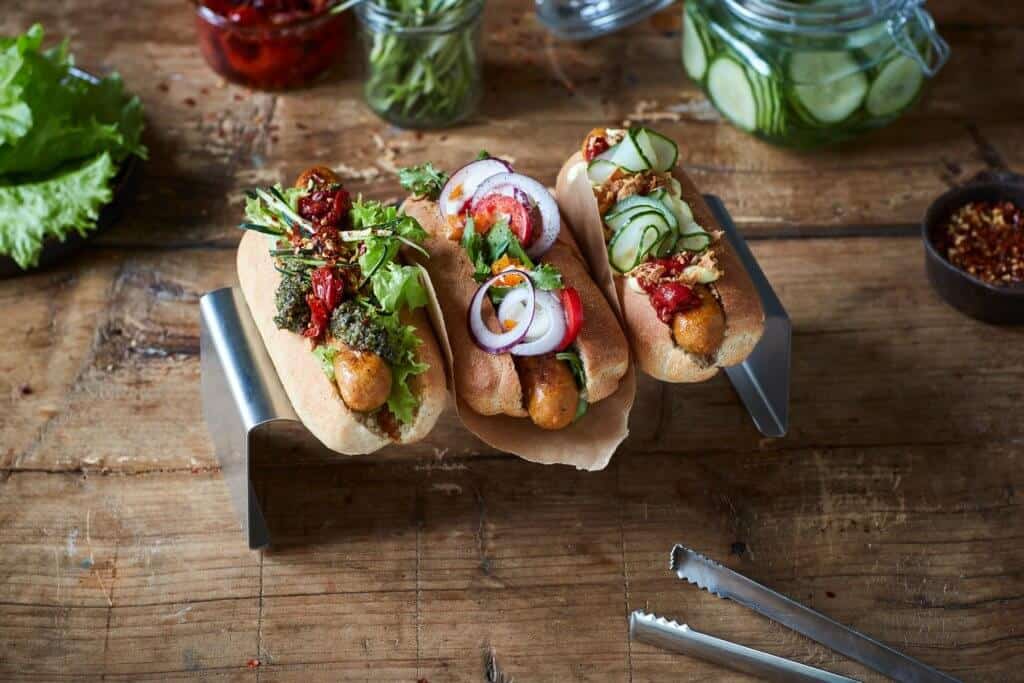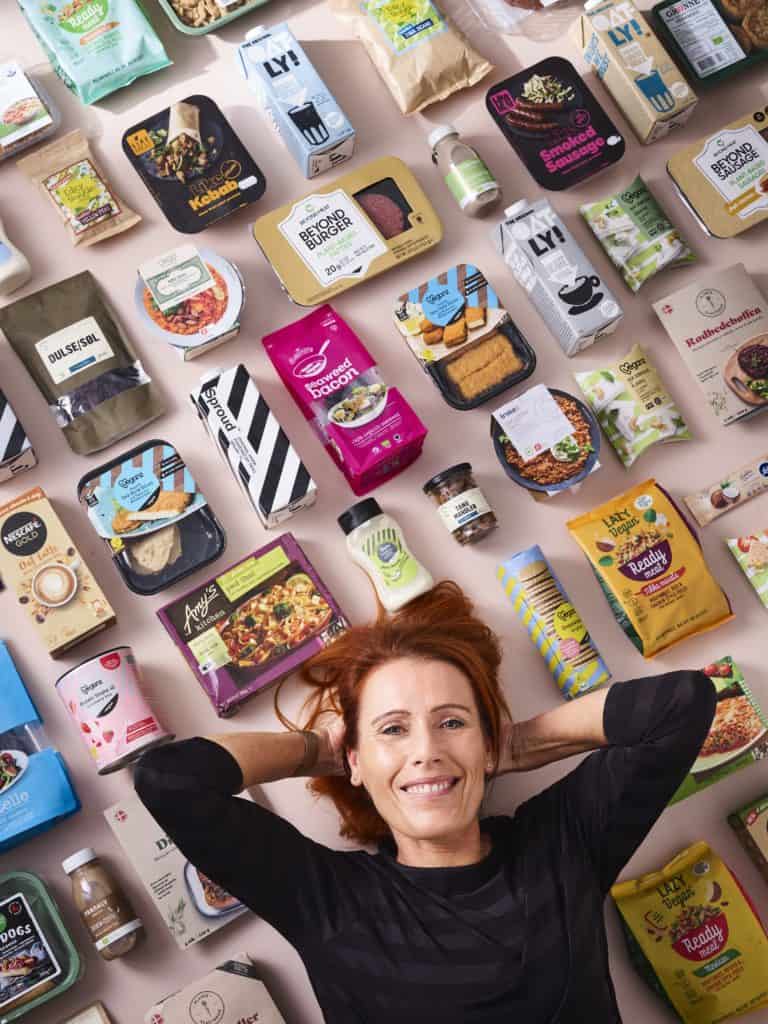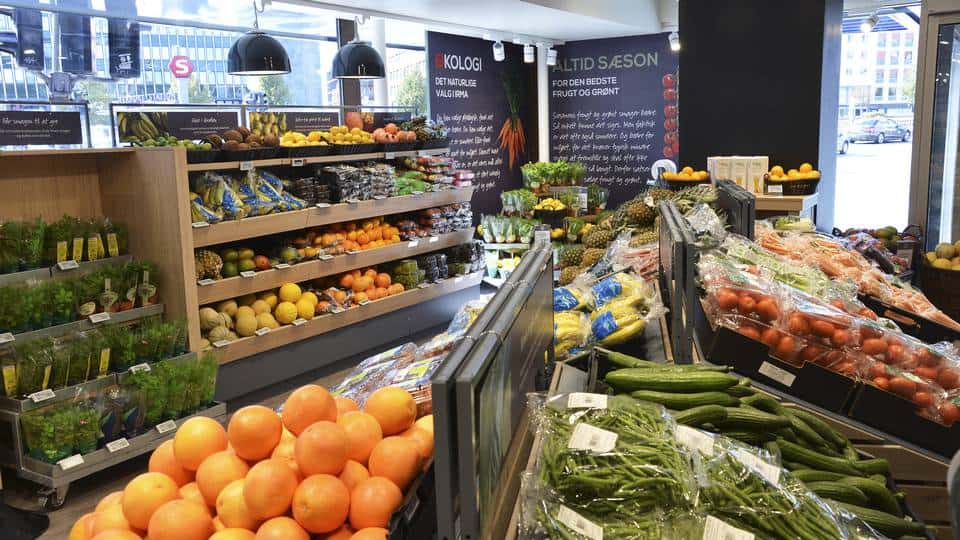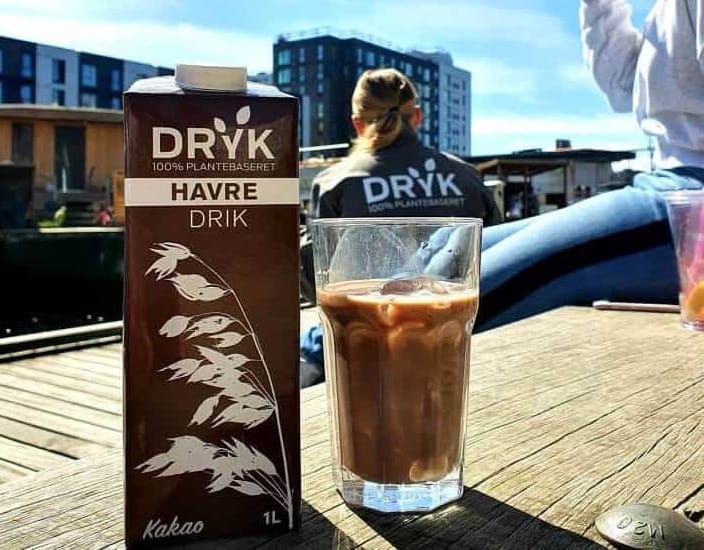Danish Supermarket Irma states that “not since the breakthrough of ecology has a commodity group grown as fast as plant-based food is doing right now,” with figures showing that plantbased sales increased by 31 percent in 2020 compared to 2019. This year, the chain expects growth of 50 percent.
Sales are now so high that Irma has created a special product group it calls KlimaMad. The chain has partnered with organic producer Hanegal, which has rethought a number of classic dishes, in a green version. The range is called Jordnær and is plant-based organic dishes made from ingredients that are in season and grown locally.
In Irma’s “Green Meal” department, the selection has increased fourfold to over 200 different products. Interest in plant-based products is highest on Irma’s home turf, Copenhagen, and the chain has a share of these products that is three times higher than the national average.

We spoke with Katrine Dalsgaard Skovly, Special Advisor, Food & Agriculture at Invest Denmark, about these interesting developments.
What are the priorities?
Denmark is known around the globe for bacon and butter, and “Made in Denmark” is a brand of safe and high quality food. Danish food production is one of the most sustainable and efficient in the world and Danish food producers have taken on the challenge of feeding the growing global population with new plant-based food products to complement existing products.
Denmark has adopted a holistic or circular approach to the development of the new plant-based segments and promotes collaboration throughout the entire value chain – from farm to fork.
When working with plant-based alternatives to traditional products, the Danish industry has not taken the approach of imitating or mimicking original products but rather an approach of creating alternatives. i.e products that can be used in the same manner and for the same purpose as the original but do not necessarily look, taste and feel identical. The focus is on creating healthy and natural products of high quality and with great taste while caring for the environment.
The emerging Danish plant-based food industry is primarily based on:
Sustainability: Denmark is known as the State of Green, and accelerating the green transition is a top priority for the Danish government as well as the industry. To the food industry, achieving the UN Sustainable Development Goals and fighting climate changes is an integral part of all innovation and product development. Danish plant-based food companies take on the challenge of being sustainable by a variety of different means; energy-efficient production, local sourcing, valorisation of side streams, organic ingredients, fighting food waste and reusable or biodegradable packaging.

Health: Danish food and ingredients companies invest heavily in research, development and new production methods to produce healthy alternatives to standard foods that do not fail on sensory quality. Reformulation is high on the agenda with a focus on ingredients that can reduce the amount of e.g. added sugar, salt and fat in food products as well as include locally sourced and high-quality plant-based proteins.
What initiatives are there in Denmark to promote the plant-based economy?
Across the entire industry, several iniatives have been taken – of which these are a few of the most recent:
- It is the vision of the Danish Food & Agriculture Council that the Danish food industry is climate neutral by 2050. To reach this vision, a research and development strategy designed to further develop plant production and plant-based food was published in November 2020 by the Danish Agriculture and Food Council in collaboration with the Vegetarian Society of Denmark and Danish think tank Frej.
- Danish national cluster organization Food & Bio Cluster Denmark in cooperation with SEGES has ensured funding of 1.5 million Euros to create a new alliance within plant-based food in Denmark. The Food & Bio Cluster Denmark/SEGES alliance aims to create new and integrated value streams from farm-to-fork and across the plant-based value chain. Food & Bio Cluster Denmark will establish and run a network to support collaboration throughout the plant-based community and boost knowledge-based innovation across the entire value chain by creating a direct link between the ingredients suppliers and the food producers.

“It is our mission to support the growth in the Danish food cluster through innovation, collaboration and entrepreneurship. The new plant-based alliance is centered around paving the way for companies looking to work with development and commercialization of the food of the future. With this alliance we wish to provide a strong and relevant forum for all stakeholders wishing to be a part of the plant-based community in Denmark,” says Lars Visbech Sørensen, CEO of Food & Bio Cluster Denmark
- True to the vision of Denmark of promoting the green transition and healthy sustainable living, the Danish Food Administration issued new Official Dietary Guidelines on January 7, 2021. The guidelines are recommendations for a diet that is not only healthy but also climate friendly. The last part is a new addition to the guidelines that have previously exclusively included advice for a healthy diet – and this addition illustrates a clear national goal of prioritizing a sustainable and green transition of the Danish nutrition and food industry.
- Danish Network for Plant Proteins was established in 2020 with more than 100 members from across the industry, academia and authorities. The network has received funding from the Green Development and Demonstration Program (GUDP) under the Ministry of Food, Agriculture and Fisheries and works to accelerate the development and production of plant-based products in Denmark – by encouraging exchange and sharing of knowledge and inspiration, promoting the development of new products and solution, and facilitating networking between the key players and stakeholders within the Danish food cluster.

How do you estimate the development of the plant-based sector in Denmark in the next five years?
With a growing global population and an increased focus on sustainability and climate changes, the need for plant-based food is going to grow year by year.
Danish companies will be well-positioned to respond to the demand for healthy, sustainable, natural, safe, affordable and convenient food products because of the Danish industry‘s innovation power, world-class research, collaboration across the value chaing and efficient production methods. Emphasis will continue to be on healthy food while sustainable ingredients and production methods is a must.
The Danish consumers are increasingly demanding more and better plant-based food and with more than half of all Danes planning to cut down their meat consumption to eat more vegetables and plant-based alternatives, Denmark is the perfect choice for developing and testing new products.
What is the importance of the plant-based sector for exports?
Denmark produces three times as much food as the country consumes and 75% of the food produced in Denmark is exported to other countries. Export of food products amount to about 25% of the total Danish export which illustrates the size of the food industry and its importance to Denmark.
Launch of new plant-based products is booming in Denmark and several Danish plant-based brands are already selling outside of Denmark. With the expected growth in the demand for and supply of plant-based food, the plant-based food production will have a positive impact on Danish export.
Are there also initiatives in Denmark to promote the cultivated meat/cheese/milk/egg sector?
A new network for cultured meat has been created on the initiative of the Department of Food Science at Aarhus University, AU FOOD. The network will accelerate the development of cultured meat based on local, Nordic ingredients as a sustainable alternative on the market:
AU FOOD accelerates the development of cultured meat within the framework of a new Nordic network





